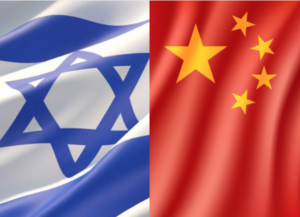How America and Israel Can Limit Dangerous Chinese Economic Influence

Photo Credit: JINSA
Xi Jinping recently pledged to the World Economic Forum that China will “uphold multilateralism.” Rather than “realizing sustainable development,” however, Xi’s version of multilateralism leads to severe negative consequences.
U.S. policymakers are already working to protect the U.S. economy from ostensibly benign Chinese trade and investment that Beijing uses to gain access to critical infrastructure, innovative technology, and intellectual property (IP) with which to grow its own military capabilities and economic power. They should also include U.S. partners in efforts to prevent China from exploiting open markets to fuel its aggressive, expansionist strategy.
Washington cannot effectively limit its own exposure if Beijing also penetrates U.S. partners. Nor can the United States develop alternatives to Chinese capital and commerce without a coalition of partners.
One such essential partner is Israel. Boasting the highest per-capita production of IP globally, Israel is an ideal target of Chinese exploitation. Given its strategic value, Washington has a strong interest in keeping Israel safe from Chinese penetration.
So far, discussions about Israel-China relations have been far too narrow, focusing on a Chinese company’s contract to modernize and operate a terminal at the Haifa Port. This poses serious espionage concerns and could prevent U.S. Naval vessels from safely visiting, weakening U.S.-Israeli security cooperation.
However, the challenge extends beyond Haifa port. China is investing in other security-sensitive infrastructure projects, like the Ashdod Port and Tel Aviv Light Rail. It is acquiring civilian products with military uses, so called dual-use technologies, or even the Israeli companies that make them, including artificial intelligence, quantum encryption, and nanotechnology. Meanwhile, Israeli academic and research institutions are at risk of espionage from Chinese joint ventures and visiting students.
At stake is Israel’s economic vitality, the U.S.-Israel relationship, and U.S. strategic influence in the Middle East.
If its economic ties to China deepen, Israel could become increasingly vulnerable to Beijing’s growing ambitions, as others have. China could use economic coercion or even political incitement, as it recently did against Australia, to demand Israeli decisions favorable to Beijing and unpalatable to Washington. Through IP theft, China could turn Israel’s innovations against it, launching market competitors or giving Israel’s technology to its adversaries, such as Iran.
Worse, by continuing to do unfettered business with Beijing, Jerusalem could find itself alienated from its historic partners as calls grow for an alliance of democratic nations against China. By doing nothing, Israel would effectively be choosing sides.
Conversely, by limiting China’s access to critical sectors of its economy, Israel could cement its position as the most important U.S. strategic partner in the Middle East. Instead of issuing demands of Jerusalem, however, Washington should pursue a cooperative approach to incentivize necessary Israeli reforms. Countries understandably fear losing access to Chinese capital, especially if no viable alternatives are available. In a recent Jewish Institute for National Security of America’s (JINSA) report, we detail a coordinated strategy for Israel and the United States to pursue together to protect themselves and others from China’s geoeconomics threat.
Israel should adopt a comprehensive, whole-of-government China strategy. Washington cannot be responsible for identifying every potentially dangerous Chinese activity in Israel; Jerusalem must take a proactive stance. This should include an intelligence review of Israel’s exposure to China and, foremost, a focus on erecting economic protections: more stringent processes for reviewing, and excluding, foreign investment in critical infrastructure; updated rules for controlling the export of sensitive dual-use technology; and an enhanced scrutiny of Chinese involvement in Israeli R&D, including in academia.
The United States, in turn, should assist Israel in crafting and executing this strategy. It can provide information on best practices, expand financing for Israeli infrastructure projects, drive investment in cutting-edge technologies, and consider providing Israel with Strategic Trade Authorization status to facilitate U.S. exports to Israel. Upgrading intelligence sharing to “Five Eyes”-level on appropriate topics would also help Washington and Jerusalem stay abreast of worrisome Chinese activities.
Finally, the United States and Israel should promote mutual trade and investment as an alternative to China. This could include negotiating a robust bilateral investment treaty and updating their existing free trade agreement. The partners should also create new institutions and programs for enhancing their economic and strategic ties, such as including Israeli firms in the existing Trusted Capital Program, which designates companies as free from foreign influence and, therefore, safe for U.S. defense contracting.
Israel and the United States must act to prevent China from driving a wedge between their vital economic and security partnership. By working together, they can protect themselves and lay the foundation for a new democratic international economic order that supports fair economic growth, stability, and security. For too long the United States was wrong in thinking that China would become a “responsible stakeholder,” and Washington should not make a similar mistake in misjudging Chinese intentions with respect investments in Israel and the Middle East.
Admiral (ret.) Jonathan Greenert served as Chief of Naval Operations. Vice Admiral (ret.) John Bird commanded the U.S. 7th Fleet. Together they co-chair the Israel-China Policy Project at the Jewish Institute for National Security of America (JINSA), where Blaise Misztal is Vice President for Policy.
Originally published in The National Interest